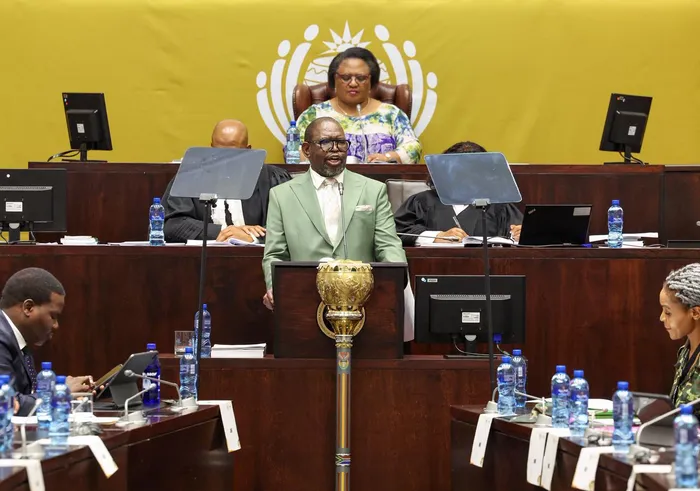
Finance Minister Enoch Godongwana tables the Medium-Term Budget Policy Statement.
Image: GCIS
The Minister for Finance, Enoch Godongwana, tabled government’s Medium-Term Budget Policy Statement (MTBPS) at Parliament.
Whilst appreciating the turnaround in key parts of the state under the African National Congress led government, in particular Eskom, Transnet, Metro Rail and the South African Revenue Service (Sars), the Congress of South African Trade Unions (Cosatu) remains deeply worried that the Budget, including the MTBPS’ proposed adjustments are not aggressive enough to take the economy from the 1% growth it has been limping along since 2008 or to tackle the 42.4% unemployment rate.
Cosatu appreciates progress made including exiting from the Financial Action Task Force’ grey listing which is key to attracting investment as well as the creation of 248 000 new jobs over the past three months and the projected increase in growth over the Medium-Term Expenditure Framework (MTEF) to 1.8%. We are, however, dismayed that Treasury remains excessively focused on reducing expenditure, debt and deficits as well as achieving a narrow surplus at the expense of badly needed economic growth and job creation.
Much has been said about the proposed reduction in the inflation target from 4.5% to 3%. Inflation robs workers’ wages when they are already battling to survive the rising costs of living. The risk in this shift is that the Reserve Bank may continue to deny badly needed repo rate relief to millions of highly indebted working- and middle-class families and an economy desperate for stimulus.
We need to tackle the root causes of inflation, namely the ever-volatile international oil price, and its resulting impact upon our fuel price regime as well as Eskom’s unsustainable dependence upon unaffordable above inflation tariff hikes. These are burning matters that government must address not squeezing workers’ meagre wages further.
Whilst the MTBPS is not a new Budget, we welcome the additional allocation of R15 billion to fund further investments in Transnet Freight Rail, R590 million for health to cover the shortfall in funding from USAID, R4 billion for school repairs, R2 billion for electricity transmission investments, R2 billion for water infrastructure in Polokwane as well as over the MTEF; R21 billion for public healthcare, R20 billion for schooling including early childhood education.
It is extremely concerning that over the MTEF below inflation adjustments for law enforcement and cuts for Home Affairs are earmarked. Frontline public services cannot afford these nor can society in the face of high levels of crime.
It is extremely disappointing that government failed to adjust the Social Relief of Distress Grant for inflation, worse when it has only once been increased since its 2020 introduction.
With unemployment stuck at 42.4%, we had hoped government would substantially expand the Presidential Employment Stimulus to at least R35 billion to provide a pathway to employment for millions.
We had hoped government would move from commitments to action to provide relief to distressed businesses and economic sectors, through tax relief, industrial subsidies and by fixing the woefully inefficient Unemployment Insurance Fund’s Temporary Employment Relief Scheme. Struggling workers and businesses need solidarity in real time.
If we are to shift economic growth to the 3% needed to slash unemployment, then a mass industrial and SMME financing package targeting at least R200 billion annually from the fiscus, developmental finance institutions and the private sector is an absolute necessity. We cannot continue along a path of business as usual and simply hope for the best when it comes to growth and employment.
The tireless efforts of the workers at Eskom have done wonders to end loadshedding. Action is needed to ensure all consumers are moved to prepaid billing to enable electricity to become affordable and thus spurring economic growth. Immediate relief is needed for companies on the verge of closure due to the high costs of electricity.
The turnaround of Transnet and Metro Rail has helped boost the economy. Interventions are needed to rebuild other State-Owned Enterprises, in particular the South African Broadcasting Corporation, the Post Office and Postbank.
Whilst welcoming interventions to fix municipal water and electricity services in Mpumalanga, a similar package of interventions is urgently needed in other dysfunctional municipalities, in particular in the North West, Free State, Limpopo, Northern and Eastern Cape. Consequences are needed for those who fail to pay municipal employees and pension funds, provide basic services and maintain infrastructure.
Progress identifying a potential 9 000 ghost employees is encouraging. These efforts must be extended across the state, including SOEs and municipalities. Those who steal from the state must go to jail. These savings must be used to employ doctors, nurses, teachers, police and other frontline staff.
The government must expedite the rollout of the Public Procurement Act. It will be a key tool in the fight against state capture and corruption and a boost for locally produced goods.
The release of R31 billion from the Gold and Foreign Exchange Reserves will ease pressure on the state. Such support should continue in a manner that is strategic and sustainable.
Cosatu commends the work done by the staff of Sars with revenue collection improving by 9.3% to the value of R19.7 billion. Further resources must be provided to Sars with a target to raise tax compliance to 75% over the MTEF. Further tax increases upon the working and middle classes must be rejected in favour of closing tax loopholes exploited by the wealthy and tackling the dangerous rise in tax and customs avoidance by illegal goods and imports.
There are positive elements in the MTBPS, including progressive victories Cosatu fought for. We are, however, concerned that government is not moving with sufficient speed, nor allocating the substantial resources required to provide the quality public and municipal services that the working class and economy depend upon, and that a tepid economy requires to reach the 3% growth rate necessary to slash unemployment, poverty and inequality.
Until there is a fundamental shift away from the politics of neo-liberalism and austerity budget cuts, then we will continue to struggle to reach our economic growth and employment targets.

Cosatu President Zingiswa Losi
Image: Independent Newspapers
Cosatu President Zingiswa Losi
*** The views expressed here do not necessarily represent those of Independent Media or IOL.
BUSINESS REPORT